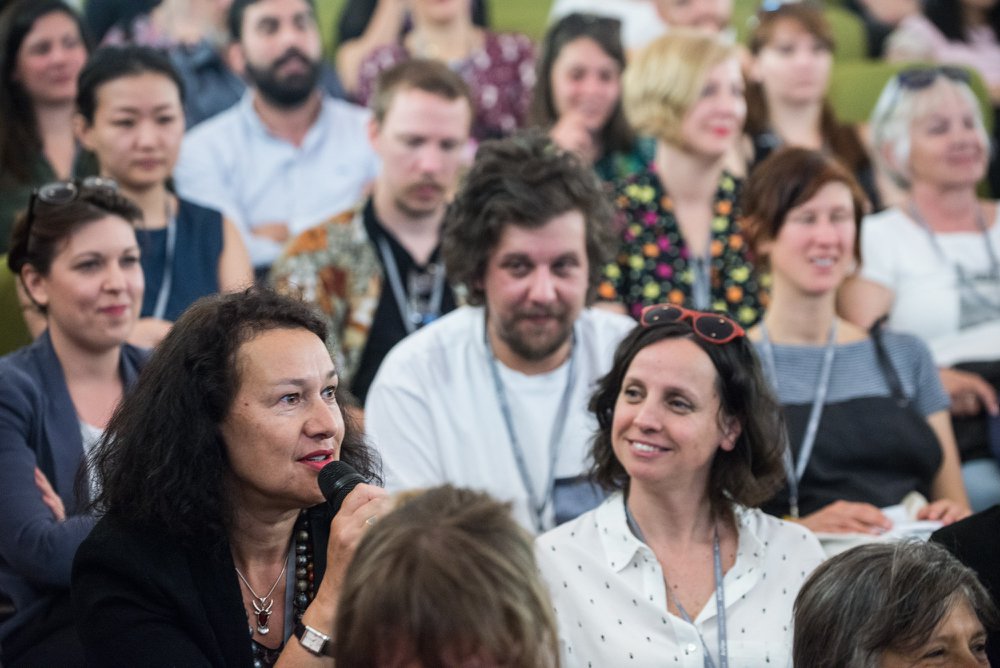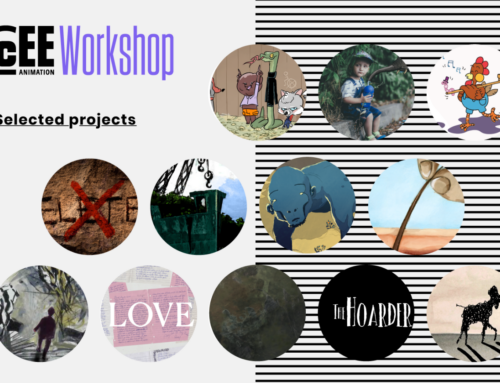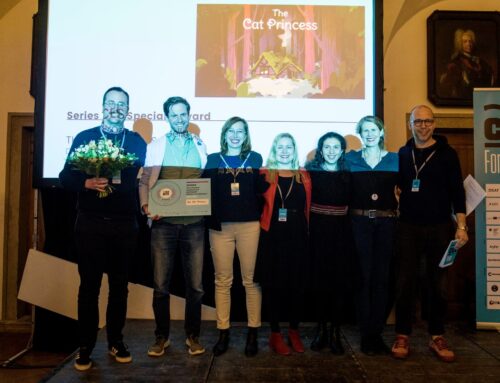Agnes Bizzaro has been working as a consultant in the field of animation for various European producers and TV stations for many years. She started off in her native France as an independent producer and gradually moved to the public TV channel France 2. One of the many professional activities she carries out at the moment is her position of content coordinator at Cartoon Springboard, a prominent Europe-wide pitching forum for young animators. Agnes has been coming to CEE Animation Forum in Třeboň for several years, sharing her plentiful experience as a tutor in the competition category of animated series and TV specials. Apart from this, she also searches for new talents and interesting projects for Cartoon Springboard (download the brochure here).
How would you describe Cartoon Springboard to students or beginner animators? What might they not have heard about it before?
Cartoon Springboard as an independent event has already been in existence for five years – this year we are holding the fifth one, which will take place from September 30 to October 2 in Valencia, Spain. From the very beginning its goal has been to create a new platform aimed specifically at young talents across Europe – anyone who has graduated from an animation school within the last five years and has a project in their minds which they would like to introduce to others on an international platform. It can be anything really: TV series, feature films or audiovisual projects combing different media, not just exclusively animation media. What counts is courage and the desire to present, because Cartoon Springboard is not just about the project itself but also about its presentation and presentation skills. Every year there are 24 projects presented and each presenter has 13 minutes for his speech and 14 minutes for feedback from the panel of experts and others.
When I talk to animation students about pitching, I often encounter fear, shyness and worries that they aren’t good enough to present outside the comfort zone of school yet. How does Cartoon Springboard try to deal with this?
I am very proud of the fact that we’ve managed gradually to create a very safe environment within Cartoon Springboard. We are aware of the fact that for many participants it is possibly their very first opportunity to give a presentation in front of a panel of experts. Compared to traditional pitching forums, our Cartoon Springboard is small and more intimate. In the audience, there are usually around a hundred or a hundred and twenty participants: distributors, representatives of TV stations, and producers, all in one boat. We think it’s really important for all participants to spend as much time together as possible during the two and half days of the event in a social setting (lunches, dinners, parties) so that there plenty of opportunities for informal conversations and networking.
How did you manage to create this friendly and “safe” atmosphere?
It starts with my position here as content coordinator. I travel around Europe a lot and I look for interesting projects and graduates of different schools, for example now here in Třeboň. The communication with potential candidates starts a few months before registering their project: we have many discussions, they can send me the first drafts of their projects, I give them the first feedback and, consequently, I might also help them with registering (I give them hints and tips or I point out some missing information in the project). Therefore, we’re in the same boat from the very beginning but even later on during the pitching itself (if their project is chosen for presentation) they get support from the presenters, whose job is to help participants with their presentations and to create a pleasant atmosphere and the feeling of a “safe environment”. I think we treat our young participants with great respect and are really helpful to them from beginning to end.
You´ve been involved with Cartoon Springboard for five years – have you noticed any progress, changes or trends in the method of presenting?
My personal impression is that young creative people are becoming more and more confident. For instance, they are not afraid to embark on bigger projects, such as TV series, or they venture to bring forth a new, fresh perspective on a very current topic. A frequent topic which is recurring and which I personally see as very important is the search for identity in relation to sexuality, which is depicted in various stories portraying one´s search for their place in the world. From a formal point of view, we are witnessing the rise of new technologies, as some projects are interactive, using 360° visualization and so on.
And how are Czech projects faring on a European level in your opinion?
I’ve had great experience with Czech projects. What comes to my mind is for example the feature film project by Lenka Ivančíková The Precious Gift, because it was here in Třeboň at CEE Animation Forum where we met for the first time. And, as you mentioned earlier, she wasn´t sure if she would be able to present in front of public (it was her first feature film project). But I convinced her that she was very talented and her visual concept was very original and eventually she came and had an amazing pitch. I think she also charmed many people with her personality too. I remember a very warm reception from British and French producers; nevertheless, animated feature film is a long process so she is now gradually working her way through it in cooperation with Michal Podhradský.
What advice would you give to beginning Czech animators who are now on the starting line of their creative journey?
Don´t just stay at home in the environment that you know intimately! There’s a whole world out there, so use any opportunity for presentation, networking and talking to people. Just like it is here at CEE Animation Forum: ask and talk to simply everyone. About their work, their producers, and what the producer´s role is in the project, because we probably all know what director or animator does, but the role of producer in animation is often quite unclear.
How important do you think the role of a producer in an animation project is?
Producers are definitely very important but not more than any other member of the team. I think it’s crucial to realize that the producer isn’t the villain (or he shouldn´t be). However, the same goes for all involved. Form a team of people that you like and you will stick with! Because animation is extremely lengthy, stressful and demanding. You could be in contact with these people every day for four or seven years, so really choose those people that you feel good around, who you can have fun with as well as an argument without losing respect for each other.
Any other tips?
I recommend travelling a lot, participating in workshops, residences and internships – meeting other young authors who often deal with the same problems like you do. Find friends, but not only virtual ones. Mainly find real friends. And don´t forget to be proud of your own tradition, because the history of Czech animation is so amazing!
Author: Eliška Děcká


